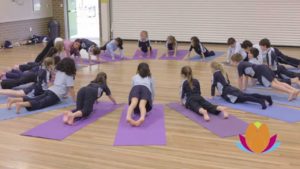By John M. de Castro, Ph.D.
“Although teens frontal lobe activity is still developing well into their twenties, they do have frontal lobes. Mindfulness practices can help teens engage their frontal lobes, and slow down and weigh the outcome of their actions.” – Donna Torney
Adolescence can be a difficult time, fraught with challenges. During this time the child transitions to young adulthood; including the development of intellectual, psychological, physical, and social abilities and characteristics. There are so many changes occurring during this time that the child can feel overwhelmed and unable to cope with all that is required. An important characteristic that develops during this time is self-efficacy, the belief in one’s ability to succeed in specific situations or accomplish a task. This characteristic is an important foundation for success in many other areas of development. So, methods that could help to improve the development of self-efficacy could be very helpful for the child in navigating the difficult adolescent years.
Yoga practice has been shown to have a large number of beneficial effects on the psychological, emotional, and physical health of the individual and is helpful in the treatment of mental and physical illness. The acceptance of yoga practice has spread from the home and yoga studios to its application with children in schools. Studies of these school programs have found that yoga practice produces a wide variety of positive psychosocial and physical benefits. These include improved mood state, self-control, social abilities, self-regulation, emotion regulation, self-esteem, and ability to focus. In addition, yoga practice produces improvements in student grades and academic performance. They have also shown that the yoga practice produces lower levels of anxiety, depression, general distress, rumination, and intrusive thoughts.
So, yoga practice may be helpful to adolescents in the development of their self-efficacy. In today’s Research News article “Influence of Yoga-Based Personality Development Program on Psychomotor Performance and Self-efficacy in School Children.” See:
or see summary below or view the full text of the study at:
http://www.ncbi.nlm.nih.gov/pmc/articles/PMC4908105/
Das and colleagues examine the effects of a 10-week intensive yoga camp on adolescents’ self-efficacy and cognitive task performance. The camp involved 10-hours per day of yoga postures, meditation, breathing exercises, relaxation techniques, and yoga games. They were measured before and after the camp for self-efficacy and the Trail Marking Test which measures fine motor coordination, visual–motor integration, visual perception, and cognitive planning ability. The results were compared with a matched group of adolescents who spent the 10-weeks in a traditional school setting.
They found that the yoga training produced a marked, significant, increase in self-efficacy including the academic, social, and emotional domains. Whereas, the control group showed no change in self-efficacy. The yoga group also showed large, significant improvements on the trail Making Test while the control group did not. These results suggest that the intensive yoga practice was very beneficial for the adolescents. The improvements in the teens beliefs regarding their ability to succeed academically, socially and emotionally has important implications for their successful navigation of the difficult teen years. In addition, their improvements in motor ability, planning, and cognitive performance suggest improved physical and intellectual development and success in school.
It is important, though, to recognize that the yoga training was very intensive. It is unclear whether a less intensive yoga program like that typically used in schools would have similarly impressive effects. In addition, the comparison, control, condition was not equivalent in that they didn’t experience a similar intensive training and social contact situation. So, it is not possible to know if it was the yoga training itself or the intensive camp context that produced the effects. It remains for future research to clarify these issues.
Regardless, the results are suggestive that yoga practice may have profound effects on teen’s development of self-efficacy, motor, and cognitive development.
“Yoga has proven very helpful for teenagers. The deep breathing, focusing, and stretching of Yoga help calm the mind and soothe the body and spirit. Restorative Yoga especially helps to balance the nervous system, and ease teens out of the flight-or-fight response. And luckily Yoga is now considered “cool” by most teenagers, so your kids can practice without worrying about being ostracized.” – Jane Heyman
CMCS – Center for Mindfulness and Contemplative Studies
This and other Contemplative Studies posts are also available on Google+ https://plus.google.com/106784388191201299496/posts
Study Summary
Das M, Deepeshwar S, Subramanya P and Manjunath NK (2016) Influence of Yoga-Based Personality Development Program on Psychomotor Performance and Self-efficacy in School Children. Front. Pediatr. 4:62. doi: 10.3389/fped.2016.00062
Abstract
Selective attention and efficacy are important components of scholastic performance in school children. While attempts are being made to introduce new methods to improve academic performance either as part of curricular or extracurricular activities in schools, the success rates are minimal. Hence, this study assessed the effect of yoga-based intervention on psychomotor performance and self-efficacy in school children. Two hundred ten school children with ages ranging from 11 to 16 years (mean age ± SD; 13.7 ± 0.8 years) satisfying the inclusion and exclusion criteria were recruited for the 10-day yogä program. An equal number of age-matched participants (n = 210; mean ± SD; 13.1 ± 0.8 years) were selected for the control group. Participants were assessed for attention and performance at the beginning and end of 10 days using trail making task (TMT) A and B, and self-efficacy questionnaire. The yoga group showed higher self-efficacy and improved performance after 10 days of yoga intervention. The performance in TMT-A and -B of the yoga group showed a significantly higher number of attempts with a reduction in time taken to complete the task and a number of wrong attempts compared with control group. Results suggest that yoga practice enhances self-efficacy and processing speed with fine motor coordination, visual–motor integration, visual perception, planning ability, and cognitive performance.
http://www.ncbi.nlm.nih.gov/pmc/articles/PMC4908105/
